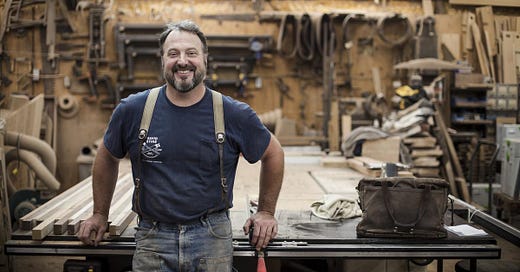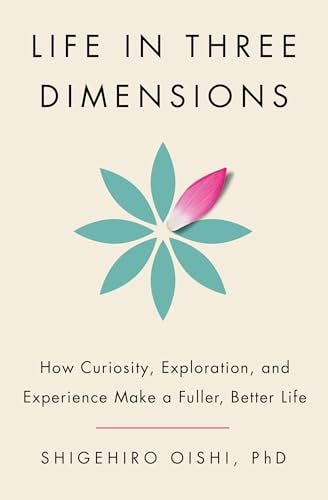For the last 7 years, my primary home has been a business school. The more time I have spent here, though, the weirder I realize it is.
Don't get me wrong — I love my job and my home institution. By weird, I mean primarily weird in the narrow vision of what success entails.
Let me give you one such example — the obsessive focus on taking something to “scale.” Here is the general idea. For some, an idea is deemed good to the extent it can be scaled — efficiently brought to a larger number of customers, leveraged through product, process, or finance. Amazon scaled an online bookstore, and then eventually expanded into e-commerce, cloud storage, and other related verticals.
There is something amazing about this kind of story of leverage. Done well, scale allows for the employment of more people, the introduction of new products to existing and new markets, and increased profit for the owner (or even efficiency in their time — something I lack).
Our culture loves the scaler. We make movies about their rise (The Social Network), shows about their drama (Succession, Yellowstone), and invite them to give speeches to graduates of our most prestigious universities (e.g., Steve Jobs at Stanford).
But the view that success EQUALS scale (and scale alone) can be irrationally all-consuming. Put another way, it is essential, after all, to remember that this is also not the only story.
This is in many ways what today's podcast episode with David Stine is about.
Before we get to that, let me give you one short example.
Last night, I took a group of our WashU MBA students to dinner at one of my favorite restaurants in St. Louis — Sidney Street Cafe (a restaurant featured in today's episode). Each of these students has a focused interest in business ownership of some kind.
During the dinner, my good friend Chris Nashan, one of the owners of the James Beard winning operation, graciously sat down with the group. I had asked Chris to explore with us how he, his brother Kevin, and sister-in-law Mina think about the strategy and long-term plan for their company. I wanted to show the students how a midsized successful business (they have 200+ employees) thinks about developing long-term plans for their group.
One part of our discussion centered on scale. As Chris reflected, some parts of their restaurant group provide natural opportunities to scale — their wonderful seafood restaurant, Peacemaker, for example, already in multiple locations. And yet, others, for example the fine dining restaurant we sat in that evening, do not scale as easily.
Put another way, if you put all businesses on some continuum of scalability, some will be higher than others. But, as soon as you do so, you realize how ridiculous it is to evaluate complex entities on a single metric. For those who have been to both these restaurants, it is not as if one is better than the other — they merely serve different purposes and should be assessed as such.
Life is like this as well. Consider all the different ways you could assess a life well lived — quality of relationships, financial net worth, meaningfulness of work, the ability to being authentic to one's sense of purpose. Wouldn’t our understanding of life be flattened if we collapsed such multi-dimensionality into a single metric?
A new friend of mine, Dave Hadani, recently recommended a book that makes exactly this point. Life in Three Dimensions by the psychologist Shigehiro Oishi argues that a life well lived can and should take place on multiple dimensions — happiness (personal well being), meaning, and full of psychologically rich experiences, the latter being his contribution to the field.
As a new parent with a 2 and 4 year old, I can feel the life design tradeoffs acutely. Two boys under five makes life significantly more meaningful (at least to me) but the day-to-day "happiness" or ease of ability to access psychologically rich experiences is more difficult. The latter requires finding a babysitter before going to that concert you have wanted to see. Heading out of town requires an ask of one’s parents for support.
But does this mean that my life before kids was better or worse? Not at all. I don’t think that optimizing one dimension (psychological richness, or personal well being) over all others is by definition better. We need better ways to assess such trade-offs, just as business leaders and owners need to think harder about the trade-offs on the values they prioritize.
That is all a long lead up to my recent conversation with Dave Stine. I got to know Dave through several restaurant and hospitality friends who have used his product — high end beautifully designed wood tables. In my conversation with Dave, you will hear an owner less drawn to "scale" in the traditional “business-school” sense.
Dave has a small number of employees and lives on a family farm just outside of St. Louis. He wants control of the customers he works with, and the freedom to say no to projects he doesn’t find interesting. He wants to grow (they have grown at 10-15% annually), but also wants to do it without having to take on significant debt; in his words, he wants to sleep well at night.
But, is this by definition better? It depends on definitions. Many of Dave’s customers, in places like Big Sky and the Hamptons, have just as intentionally pursued scale. Dave sees the trade-off in these choices and shares some of how that insight has shaped he and his wife’s approach to their company. I think his insight might inform how you think about growth as well.
As you listen to (or read below) my conversation with Dave, I want to leave you with a few simple questions. I would be curious to hear your take, and how your answers might deviate from that of Stine.
How do you prioritize scale amongst all the potential values in play for an organization? What trade-offs are you willing and not willing to take given such prioritization?
If your business (or career) were not allowed to grow any larger than it is today, what would you need to change about your framing to make it feel like success?
Which dimension of a well-lived life—happiness, meaning, or psychological richness—do you currently prioritize, and what is being undernourished as a result?
Thanks for reading along, and listening. Let us know what resonates with you!






